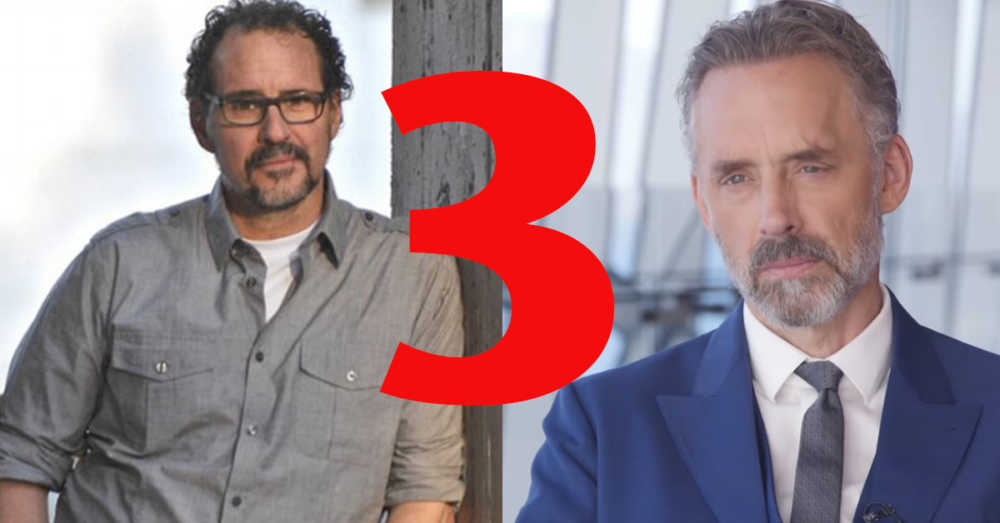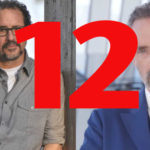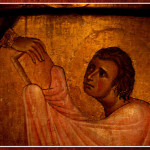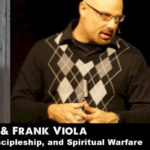We run our website the way we wished the whole internet worked: we provide high quality original content with no ads. We are funded solely by your direct support. Please consider supporting this project.

Part 3 (of 15): The Leap of Faith
Assessing Jordan Peterson’s “12 Rules for Life”
by Greg Boyd
I’ll begin by saying I’ve received several video clips of Jordan saying some rather outrageous and offensive things. I was, frankly, quite surprised, since I found 12 Rules of Life to be, on the whole, a seemingly thoughtful and fairly objective book. Yes, he gets passionate at times (especially toward the end), but never says anything like what these videos indicate. I’m going to continue to focus mostly on his book, but since some have asked me to comment on these videos, I plan on doing so at the close of this series.
On a related note, I’m aware that some readers are mainly interested in what I have to say about Peterson’s controversial conservative stances on various social issues (e.g. the “proper” roles of men and women, the legitimacy of social hierarchies, his refusal to use neuter pronouns for transgender people). I promise I will get to these several posts from now. But I believe it would be unfair to weigh in on Peterson’s conservative social stances without first appreciating the foundational aspects of his thought that ground these stances. Lacking this, it would be all too easy to dismiss his views as nothing more than uninformed prejudicial opinions, which seems to be happening more often than not. It would be like evaluating Peterson’s 12 Rules without engaging with the essays that ground them. Anyone who has read 12 Rules for Life knows that each rule scarcely represents the tip of the iceberg of ideas and insights contained in each supporting essay.
For this reason, I am attempting to organize Peterson’s philosophy, as it is expressed in 12 Rules of Life, beginning with what I believe are the most foundational aspects of his thought. In the previous post I considered Peterson’s foundational conviction that suffering is inherent in the very concept of Being. We saw that the most fundamental question that 12 Rules of Life addresses is this: How can we find meaning that can make our life worth living in the face of life’s inevitable hardships—especially when our suffering or the suffering of a loved one becomes “existentially intolerable” (347)? Which is to ask: How can we justify our existence, and thus justify Being itself?
Today I will discuss the faith that Peterson contends we should all embrace as we struggle with our own hardships and the suffering that afflicts people [and, I would add, animals] around the globe.
—–
When Peterson was a young man, he contemplated the possibility that “all value structures” were actually “merely the clothing of power” (197). In other words, he was to some degree tempted to embrace the post-modern, deconstructionist perspective of Derrida and others (the very philosophy that is now his main nemesis). Curiously enough, the thing that began to free Peterson from this temptation was his reflections on the Holocaust and the Nuremberg trials that followed, in which Herman Göring, Rudolf Hess, and twenty-two other high-ranking officials in the Third Reich were convicted of crimes against humanity.
Peterson came to see that the moral judgments pronounced against these twenty-four horrible men could not be understood merely as expressions of the preferences of those in positions of authority – as “clothing for power” – as though it would be legitimate for some other conceivable culture that had different people in charge to deem the atrocities carried out in the Holocaust to be “good.” Rather, Peterson came to see that the moral judgments that were pronounced at the Nuremberg trials presuppose that “value structures” are part of the structure of reality itself.
This led Peterson to the following all-important conclusion:
There are some actions that are so intrinsically terrible that they run counter to the proper nature of human Being. This is true essentially, cross-culturally – across time and place. These are evil actions. No excuses are available for engaging in them (197).
This insight led Peterson to the realization that, ”if there is something that is not good, then there is something that is good.” And whatever else may comprise “the good,” it most certainly includes “whatever stops such things [as the Holocaust] from happening” (198). This insight inspired Peterson to adopt the moral imperative that has directed his life ever since, and that is the ethical foundation for Peterson’s entire outlook on life. “[T]o the best of my ability,” he resolved, “I will act in a manner that leads to the alleviation of unnecessary pain and suffering” (198).
Yet, good and evil are objective realities. Thus, Peterson’s resolve to aim for the good and to minimize suffering can’t be understood merely as his own personal life mission, as though other people could just as legitimately adopt a life mission that was entirely self-focused, that had nothing to do with improving their own moral character, and/or had nothing to do with alleviating the suffering of other people or of animals. Peterson is rather convinced that every human being has an inherent moral obligation to first strive to become the best person they can become and to thereby strive to “make the world better” (200). Every person is called upon to commit themselves to “the Improvement of Being, with a capital ‘I’ and a capital ‘B’” (107). Peterson expresses this universal imperative when he says:
Align yourself, in your soul, with Truth and the Highest Good. There is habitable order to establish and beauty to bring into existence. There is evil to overcome, suffering to ameliorate, and yourself to better…. (109)
This commitment alone, Peterson says, gives meaning to our life and justifies our existence—despite the inevitable suffering we encounter and despite the limitations and imperfections of our own lives which, to one degree or another, inevitably contribute to the world’s suffering:
[O]nce you have placed “Make the world better” at the top of your value hierarchy, you experience ever-deepening meaning. It’s not bliss. It’s not happiness. It is something more like atonement for the criminal fact of your fractured and damaged Being. It’s payment of the debt you owe for the insane and horrible miracle of your existence (200).
Similarly, Peterson writes that if you are willing to “devote your life” to “help direct the world, on its careening trajectory, a bit more toward Heaven and a bit more away from Hell,” it will “give you a Meaning, with a capital M,” which in turn “would justify your miserable existence” and “atone for your sinful nature” (63-64).
Peterson is aware that the decision to live out this moral imperative requires a leap of faith, for “the tragic irrationalities of life must be counterbalanced by an equally irrational commitment to the essential goodness of Being” (107). To strive for the goodness of Being, in other words, requires faith that Being is essentially good, despite the horrific suffering that inevitably comes with it. This is not something that Peterson believes can be proven. It rather requires “the ‘act of faith’ whose necessity was insisted upon by the Danish philosopher Kierkegaard” (206).
Actually, Kierkegaard is best known for talking about “the leap of faith,” and because Peterson acknowledges that this faith is as “irrational” as the tragedy of life, I believe “leap of faith” expresses the decision that Peterson calls on people to make much better than the much less radical “act of faith.”
Peterson addresses the topic of faith in several places in 12 Rules of Life, but the discussion I found to be the most interesting takes place in a context in which he’s comparing the God of the Old Testament with the God of the New Testament. While he thinks the difference between these two portraits of God has often been exaggerated (in part because he assumes the Book of Revelation depicts a remarkably violent Jesus, which I and many other scholars argue is fundamentally mistaken), Peterson nevertheless grants that the New Testament depiction of God is, on the whole, “all-loving and all-forgiving,” while in the Old Testament God is often anything but. When the ancient Israelites “wandered carelessly down the wrong path,” Peterson says, “they ended up enslaved and miserable – sometimes for centuries – when they were not obliterated completely.” And then he asks, “Was that reasonable? Was that just?. Was that fair?” And he continues:
The authors of the Old Testament asked such questions with extreme caution and under very limited conditions. They assumed…[God] was a Force of Nature. Is a hungry lion reasonable, fair or just? What kind of a nonsensical question is that? The Old Testament Israelites and their forbears [sic] knew that God was not to be trifled with, and that whatever Hell the angry Deity might allow to be engendered if he was crossed was real.
And then Peterson concludes; “Having recently passed through a century defined by the bottomless horrors of Hitler, Stalin, and Mao, we might realize the same thing” (105). (Note how Peterson assumes that these horrors reflect the “Hell” that an “angry Deity” allowed, if not intentionally brought about, because he was “crossed.” I’ll say more about this in the next post).
It is in light of the two contrasting views of God found in the two Testaments that Peterson articulates what it means to have faith in the essential goodness of Being. Peterson encourages people to
…decide that you will start treating Old Testament God [Peterson, for whatever reason, never uses a definite article when talking about the New and Old Testament God], with all His terrible and oft-arbitrary-seeming power, as if He could also be New Testament God (even though you understand the many ways in which that is absurd). In other words, you decide to act as if existence might be justified by its goodness—if only you behaved properly. And it is that decision, that declaration of existential faith, that allows you to overcome nihilism, and resentment, and arrogance. It is that declaration of faith that keeps hatred of Being, with all its attendant evils, at bay (107, italics added).
In other words, Peterson is encouraging us to continue to affirm the goodness of Being – represented by the New Testament God – even though Being can be as unjust and as cruel and as capricious as “a hungry lion” or any other “Force of Nature” – represented by the Old Testament God. In the face of the arbitrary horrors that reality/God (he frequently equates the two) inflicts on humanity, Peterson encourages us to act as if reality/God was essentially good and to therefore commit to “the Improvement of Being”(107). And we are to do this fully aware of “the many ways in which that is absurd” (107).
The ancient Jews had already embraced something like this absurd faith, according to Peterson. Reflecting a willingness to take personal responsibility for their own hardships, which we will later see is a central tenet of Peterson’s ethic, he writes:
The ancient Jews blamed themselves when things fall apart. They acted as if God’s goodness – the goodness of reality – was axiomatic, and took responsibility for their own failure…
The alternative, Peterson once again adds, “is to judge reality as insufficient, to criticize Being itself, and to sink into resentment and the desire for revenge” (157).
It is this absurd decision to act “as if” Being was essentially good, despite the seemingly arbitrary horrors it inflicts on us, that constitutes Peterson’s faith, which is precisely why I think Kierkegaard’s description of faith as “a leap” is apropos. While this leap is in many ways “absurd,” Peterson argues that it is warranted, if not necessitated, by the fact that the alternative to this is much worse. For if we conclude that Being is not good – not “justified” – Peterson argues that we’ll find ourselves descending down into a bottomless pit of resentment, arrogance, nihilism, and the “hatred of Being” that Peterson repeatedly identifies as “Hell” and “evil” (e.g. 217; 220, 227; 367).
Hating life, despising life – even for the genuine pain that life inflicts – merely serves to make life itself worse, unbearably worse. There is no genuine protest in that. There is no goodness in that, only the desire to produce suffering, for the sake of suffering. That is the very essence of evil (346-47)
Elsewhere Peterson notes that people who conclude from the pain of their existence that Being is not good are “flirting with suicide.” And if the burden of their miserable existence leads them to take a step further and conclude that “it would be better if Being itself didn’t exist,” they are now “toying with genocide- and worse.”
“What is truly horrifying,” Peterson adds, “is that such conclusions are understandable, maybe even inevitable – although not inevitably acted upon” (346). Only by taking the leap of faith in the essential goodness of Being can we keep ourselves, and our culture, from going down this road to Hell.
At many points in his book, Peterson sounds like a straight-out pragmatist, arguing that people should live as if Being was essentially good simply on the grounds that the alternative is so painful, and potentially so catastrophic. People can “survive through much pain and loss” and “persevere,” he says, if they “see the good in Being.” But “[i]f they lose that, they are truly lost” (351). Hence, people should aim “at the betterment of Being,” if only “[b]ecause we know the alternative. The alternative was the twentieth century” (189), the horrors of which Peterson repeatedly insists were the direct result of people losing faith in God, the goodness of being, the reality of values, and, therefore, the ultimate meaningfulness of life. It was the “death of God” that Nietzsche announced so boldly – and, according to Peterson, so profoundly — and the death of Judeo-Christian values that accompanied it, that led directly to the “great collective horrors of Communism and Fascism…” (193). For Peterson, any belief and commitment that can prevent that from happening is good and worth embracing, if only for that reason.
While I think Peterson reflects some interesting psychological and philosophical insights in the material we’ve covered in this essay, I am also convinced that his pragmatic defense of the leap of faith, as well as his conception of the “Highest Good” that he calls us to pursue, are fundamentally misguided. And these misconceptions, I will argue, skew crucial aspects to his entire philosophy as well as his social theory. To keep this post to a reasonable length, however, I must reserve these objections for the following post.
Category: General
Tags: Book Reviews, Books, Jordan Peterson
Related Reading

Part 12 (of 15): Egalitarianism and The Kingdom Community
Assessing Jordan Peterson’s 12 Rules for Life by Greg Boyd As we saw earlier in this series (see: post 7), Peterson argues that social hierarchies among humans are as natural as they are among lobsters and every other species of animal on the planet. Whenever there is anything worth doing, anything of value, some people…

Part 8 (of 15): Race and Social Hierarchies
Assessing Jordan Peterson’s 12 Rules for Life by Greg Boyd “The degree to which the terrible part of the world manifests itself in your life is proportionate to how insufficient you are….If you got your act together completely, maybe all the suffering would disappear from your life, or at least all the unbearable suffering.” Jordan…

Part 3: Disarming Flood’s Inadequate Conception of Biblical Authority
Image by Ex-InTransit via Flickr In this third part of my review of Derek Flood’s Disarming Scripture I will offer a critique of his redefined conception of biblical inspiration and authority. I will begin by having us recall from Part I that Flood holds up “faithful questioning” over “unquestioning obedience” as the kind of faith that Jesus…

How NOT To Be Christ-Centered: A Review of God With Us – Part I
Theologians throughout Church history have used the concept of divine accommodation to account for everything in Scripture that seemed “unworthy” of God. Whatever didn’t line up with what we know about God was seen as God accommodating his revelation to our limited and fallen framework. The trouble is, theologians have, by and large, used the…

Podcast: The Frank Viola Interview on INSURGENCE
Greg and Frank talk Kingdom of God. Greg interviews best-selling author Frank Viola about his Insurgence. Why does the allegiance that radical terrorists give to their false cause exceed the allegiance that most Christians today give to Jesus Christ? Have we lost the explosive, earthshaking gospel of the kingdom that Jesus, Paul, and the other…

Part 18 (of 20) — Jordan Peterson on Jesus
Assessing Jordan Peterson’s 12 Rules of Life “What does [Jesus’ teaching to love your enemies] mean? Learn, from the success of your enemies; listen…to their critique, so that you can glean from their opposition whatever fragments of wisdom you might incorporate, to your betterment.” Jordan Peterson In the previous post we saw that Peterson has…
